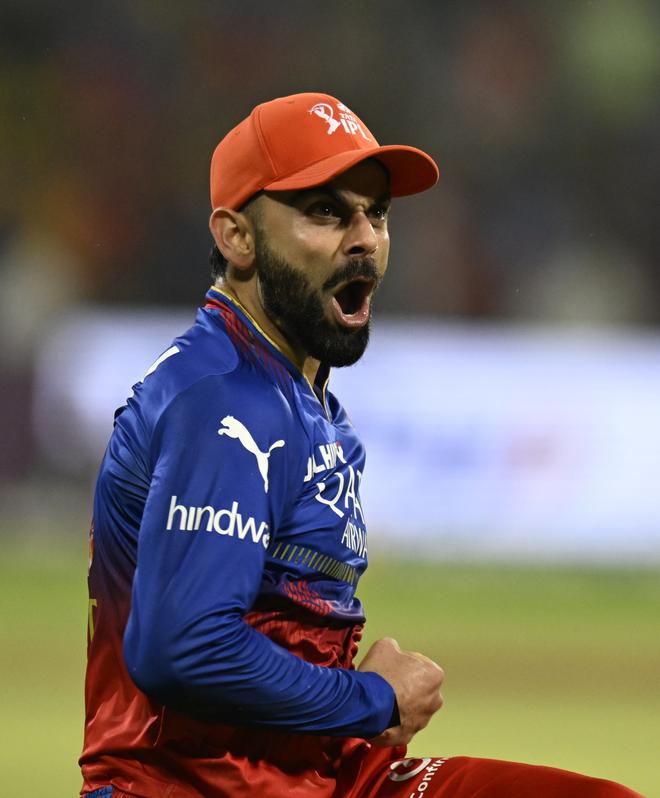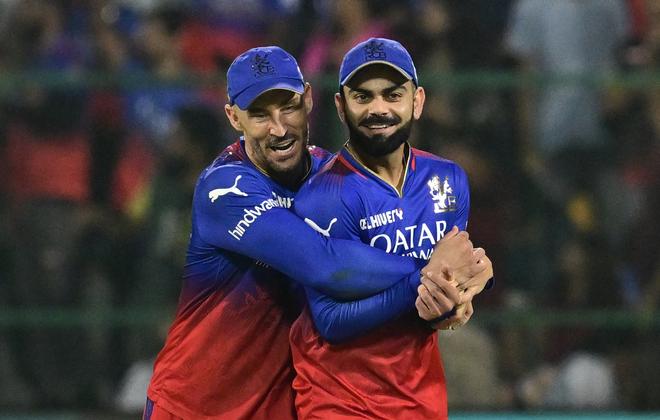It’s been an interesting — for want of a better word — IPL for Virat Kohli. The former India captain has scored runs aplenty for Royal Challengers Bengaluru, reignited debates over his strike-rate, reinvented himself to score faster than he previously has in T20s, incensed legends of the game with his abrasive remarks, and fuelled his franchise’s late charge for a place in the playoffs. With Kohli around, the one thing that is guaranteed is frenzied, frenetic action; despite the passage of time, his passion and intensity remain undimmed though occasionally, he treads the thin line between the aggressive and the churlish most dangerously.

Kohli’s in-your-face attitude and his electric dynamism on the field have endeared him to millions; a small minority is of the view that, as the elder statesman that he is now, he should set a more acceptable example for the numerous young kids who idolise him, but Kohli will have none of it. He continues to excite, exhilarate and exasperate in equal measure, refusing to veer away from the persona that has made him a household name in the cricketing world.
At the conclusion of RCB’s glorious league campaign, Kohli is the clear leader in the race for the Orange Cap. He topped 600 runs for the fourth time in a single IPL season, his tally of 708 runs embellished by one century and five half-tons in 14 innings.
After the league stage, only Abhishek Sharma has more sixes (41) than Kohli (37). At the top of the batting order, he has the set the tone that RCB only built on midway through its campaign after being pushed to a point of near no-return with seven defeats in its first eight matches.
New version
Even during that dismal run which included six losses on the bounce, Kohli batted on a different plane from his colleagues. It wasn’t just the quantum of runs he unleashed, impressive as they were. This was a new Kohli, perhaps driven by stinging criticism, perhaps motivated to show that despite 16 years at the international level, he isn’t averse to learning new tricks. That has manifested itself in mostly bruising batting displays which have papered over the irregular laborious stint. He has professed to shedding the fear of getting out, which he says has allowed him to go for his strokes from the get-go, with the field restrictions in place in the first six overs.
Still banking on the orthodox and the conventional but not chary of turning to the cheeky when the mood so seizes him, Kohli has been terrific to watch. He has always been the most vocal advocate, through his actions, of not having to resort to the crude to be successful in the 20-over game; this season’s returns and the manner in which they have been accrued are a further affirmation of his conviction that adhering to correctness isn’t anathema to the grain of T20 cricket.
Just the other day, Kohli provided a glimpse of what his life will be like once he hangs up his boots. The very fact that he is willing to talk about it might have disheartened the Kohli faithful, apprehensive that the run-machine might not be around for too much longer.
Plenty of miles to go
There is no point speculating when he will walk away from the game, because that is a personal decision and entirely his to make. But on the evidence of the fare on view in this IPL, Kohli still has plenty of miles left in his much-used legs.
Both with the quantity and quality of his runs over the last eight weeks, Kohli has made a strong case for himself to open the batting at the T20 World Cup next month in the Americas with his captain, Rohit Sharma. Deposed as Mumbai Indians’ headman despite having led his franchise to five titles in his 10 and a half years in command, Rohit has had a topsy-turvy run; 297 runs in his first seven innings were followed by a terrible lull that netted him only 52 in the next six. He did sign off with a flourish, smashing 68 off 38 deliveries on Friday night in another losing cause as MI finished bottom of the pile with just four victories from 14 outings.
His tally of 417 runs (strike-rate 150) is his most since 489 in 2016; before IPL 2024, his highest strike-rate in 16 previous editions was 147.98, in the inaugural season in 2008 for Deccan Chargers.
Kohli and Rohit have opened previously in T20Is, with reasonable success. The case for them coming together at the top of the batting tree has been strengthened by the middling to poor returns of Yashasvi Jaiswal, picked as a specialist opener, as well as the balance it will give the team and the options it will provide in the middle order, where Shivam Dube looms as a certified slayer of spin with his power-packed game.
Before the IPL, Rohit-Jaiswal might have been the preferred combo but the left-hander has only managed 348 runs, half of which have come in two innings (a century and a fifty) alone. While there is great merit in having a left-right combination, Travis Head and Abhishek Sharma have proved that left-left can be equally devastating.

Kohli and his RCB skipper Faf du Plessis have struck a blow for right-right, so there is no reason Kohli can’t reprise his franchise heroics with his national captain for company at the World Cup.
The sport’s newest international format has no place for anchors — there was a time when one individual batted deep and long and the rest teed off around him, but that has passed into history with unalloyed stroke-making from both sides the norm. But Kohli has revealed his adeptness at batting deep into the innings without sacrificing an acceptable rate of scoring. True, he made the slowest IPL hundred on Indian soil, off 67 deliveries, against Rajasthan Royals but in IPL 2024, he has a strike-rate of 155.60, significantly higher than his career IPL strike-rate of 131.95, his overall T20 strike-rate of 138.15 and his T20 international strike-rate of 138.2. Players often take exception when strike-rate is used as a point of reference, but that is the yardstick by which impact is measured.
Consistency is most welcome, but that mustn’t be restricted to run-making alone. An impressive average has little meaning if the runs haven’t been scored quickly enough to put the team in the ascendancy. That’s what Kohli has done this season. He was let down in the first half by his misfiring batting colleagues with the honourable exception of Dinesh Karthik, but once the likes of du Plessis, Rajat Patidar, Will Jacks and Cameron Green got going, RCB has been a whole different beast altogether.
Inspirational
Most admirably, even when his team was on a seemingly inexorable downward spiral, Kohli retained his focus, believing that it was only a matter of time before the others turned the corner. It was impossible for his mates not to be inspired by Kohli’s deeds. Single-handedly, almost, he ensured that despite the string of defeats, RCB didn’t lag in the run-rate stakes. Oftentimes, it’s this significant entity that signals the difference between ecstasy (making the playoffs) and agony (awaiting the start of the next season). That RCB overturned its abysmal early-season run and strung six wins together to advance is a tribute to Kohli’s fire, as much as anything else.
Kohli will, as ever, be one of the crucial components of the Indian batting wheel at the World Cup. If, as predicted, the pitches in the United States and the Caribbean are on the slower side, the new ball is the time to make merry; the middle overs will call for dexterous placement of the ball and frenzied running between the wickets. Few in the modern game are more felicitous in these regards than the 35-year-old from Delhi, as fit as they come and blessed with the great gift of judging a run to perfection.
Indeed, Kohli’s biggest challenge over the years has been to run to his partner’s strengths, not his own; he hasn’t always successfully managed that, but in a middle-order of Rishabh Pant, Hardik Pandya and Ravindra Jadeja, he will find kindred spirits who are no slouches between the wickets.
In all probability, this will be Kohli’s last T20 World Cup, a tournament he has never won. Kohli had yet to break through during India’s driving surge to the title in the inaugural edition in 2007, therefore there is unfinished business to attend to.
India’s last World Cup triumph came in 2011, their last global silverware in 2013 (Champions Trophy). For a team that has been so consistent for so long and is currently ranked No. 1 in both limited-overs formats (it is at No. 2 in Tests, behind Australia) to endure such a prolonged barren run must be galling for Kohli and Rohit respectively, both closer to the end of their careers than the beginning.
This is their chance, maybe their final hurrah together, to set the record straight. Under Kohli, Rohit smashed five centuries at the 2019 50-over World Cup in England, though India crashed out at the semifinal stage. Kohli will be desperate to return the favour, and go one better, next month in the Americas. What fun that will be.







